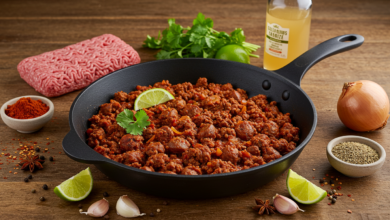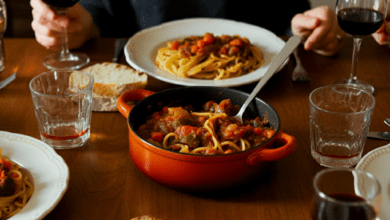How to Cook Boudin? 3 Easy Ways
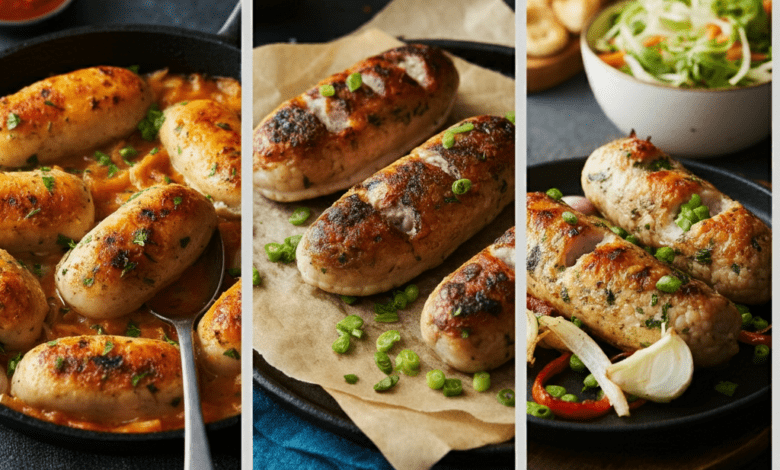
Boudin, a delicious Cajun sausage filled with rice, meat, and spices, is a beloved dish in the South. Whether you’re in Louisiana, Texas, or anywhere that celebrates Cajun culture, learning how to cook boudin properly is an essential culinary skill. This article will guide you through the best ways to cook boudin, whether you prefer it crispy and grilled, tender and steamed, or evenly baked in the oven. We’ll cover essential techniques, tips, and some useful serving ideas to make sure your boudin turns out perfect every time.
Table of Contents
What is Boudin?
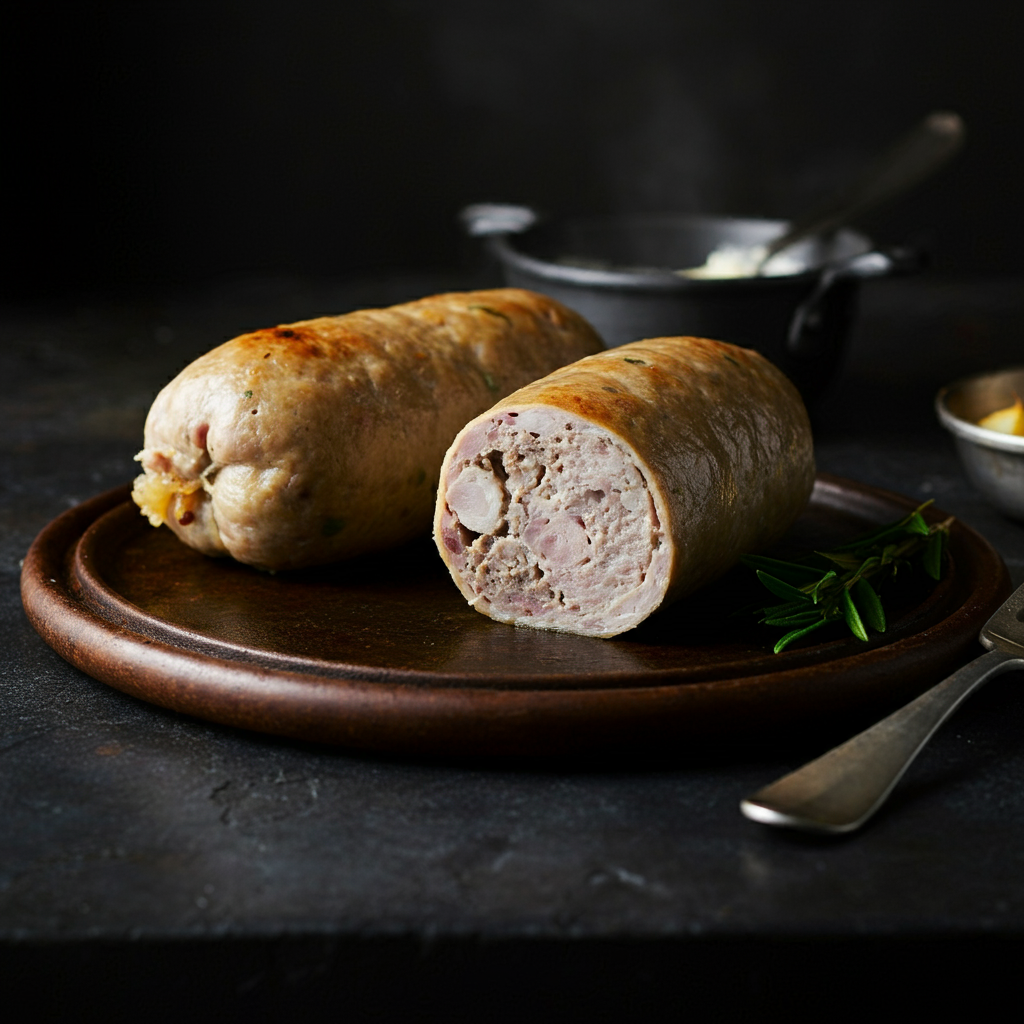
Boudin is a type of sausage originating from Cajun culture in Louisiana. The dish traditionally combines pork, rice, liver, onions, and a blend of spices, creating a rich, savory flavor profile. While pork boudin is the most common, variations include chicken and even seafood. Often served as a snack, appetizer, or part of a larger meal, boudin is typically encased in a natural casing that adds texture when cooked.
The charm of boudin lies not only in its ingredients but also in the way it’s prepared. Whether grilled, steamed, or baked, the cooking method plays a significant role in the final texture and flavor.
How to Cook Boudin: Step-by-Step Guide
There are several ways to cook boudin, and each method brings out different flavors and textures. In this section, we’ll break down the best techniques for preparing boudin in the comfort of your own home.
Grilling Boudin
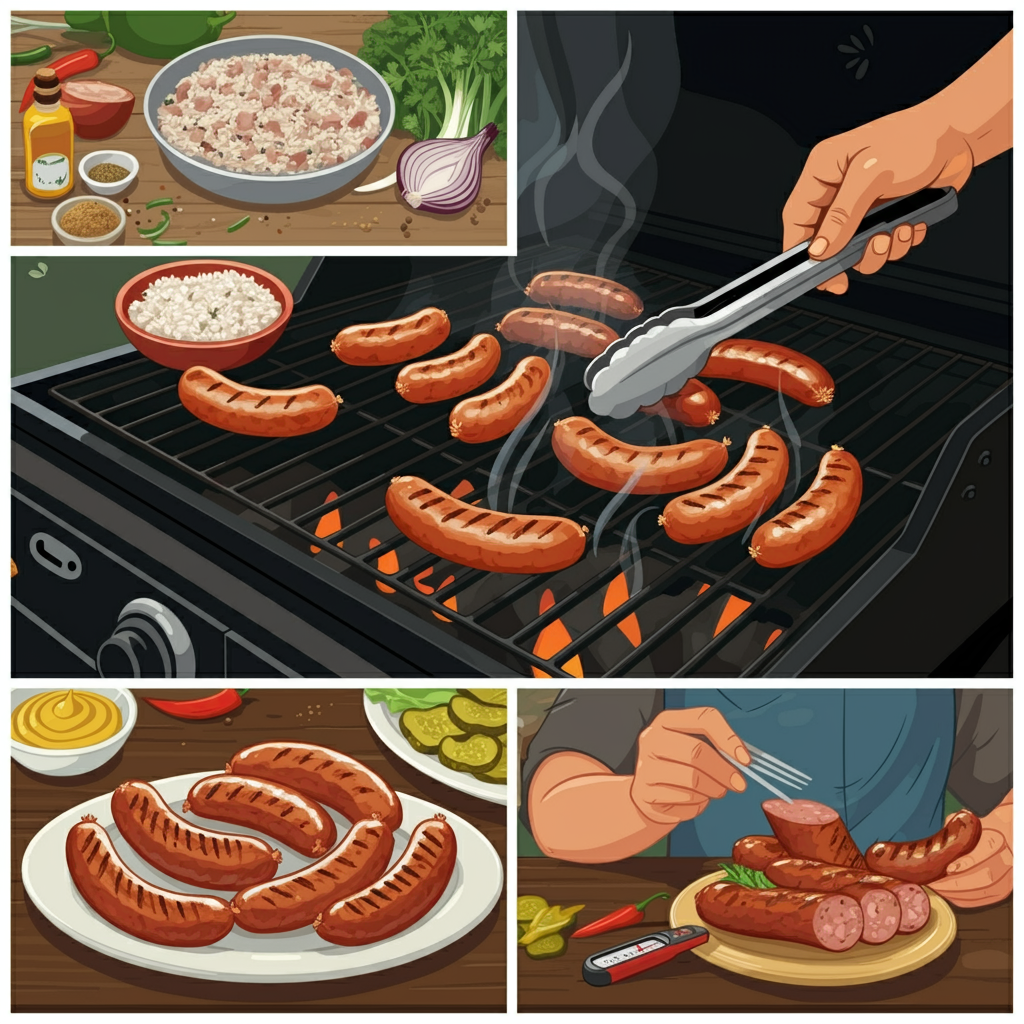
Grilling boudin is one of the most popular methods because it gives the sausage a deliciously crispy exterior while keeping the interior moist and juicy. Here’s how you can do it:
- Preheat the Grill
Heat your grill to a medium setting, around 350°F to 375°F. If you’re using charcoal, allow it to burn down until the coals are glowing red. - Place the Boudin on the Grill
Lay the boudin directly on the grill grates. You can brush the sausage with a little oil to prevent sticking, but it’s not necessary. - Cook for 7–10 Minutes per Side
Grill the boudin for 7–10 minutes on each side, turning it carefully with tongs to avoid piercing the casing. The goal is to get a golden-brown, crispy skin while keeping the sausage moist inside. - Check for Doneness
Once you’ve achieved a crisp, golden casing, check the internal temperature with a meat thermometer. It should reach 160°F (71°C).
Tip: Avoid pricking the boudin as it cooks, as this can cause the juices to escape, resulting in a drier sausage.
Steaming Boudin
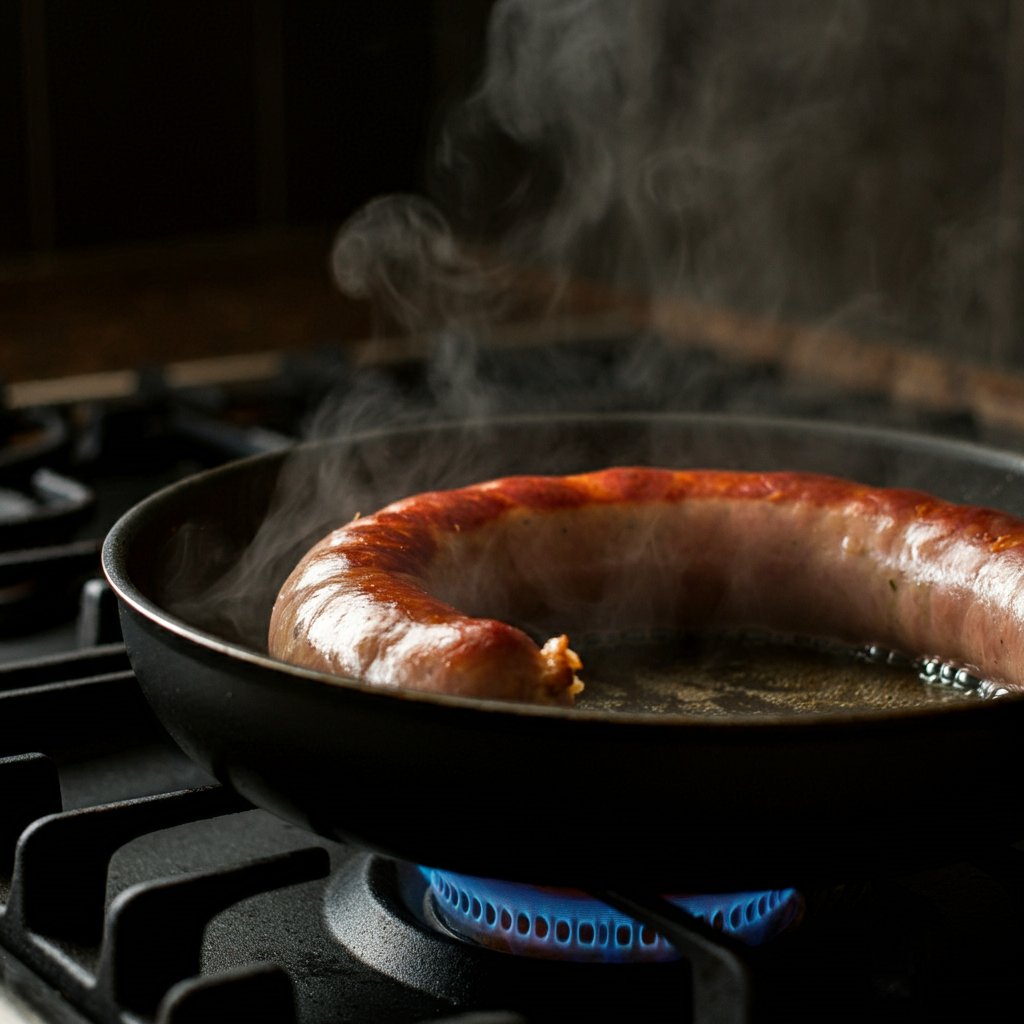
Steaming boudin is a fantastic option if you prefer a juicier texture. Steaming locks in moisture, leaving the sausage soft and tender. Here’s how to steam boudin:
- Prepare the Steamer
Fill a pot with water and bring it to a boil. You’ll need a steaming basket or rack to hold the boudin above the water. If you don’t have a dedicated steamer, you can use a colander or strainer placed over the pot. - Place the Boudin in the Steamer
Lay the boudin in the steaming basket, making sure they are not touching the water. - Steam for 10–12 Minutes
Cover the pot and allow the boudin to steam for 10–12 minutes. This will heat the sausage through without drying it out. - Check for Doneness
The boudin should be hot and tender. Again, check the internal temperature to ensure it reaches 160°F (71°C).
Tip: Steaming is a great option if you want to keep the casing soft and the meat inside moist.
Oven-Baking Boudin
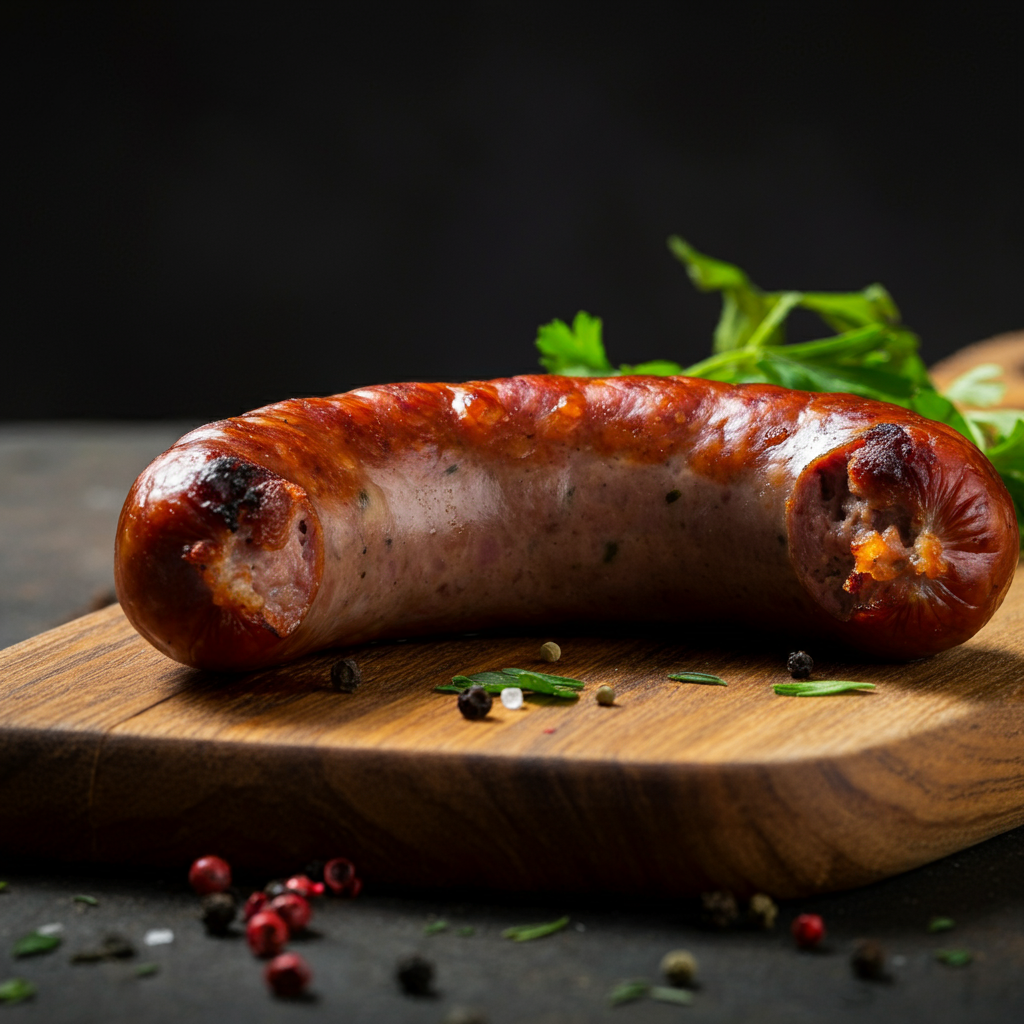
Baking boudin in the oven is a hassle-free option that evenly cooks the sausage, making it an excellent choice for busy weeknights or large gatherings. Here’s how to bake boudin:
- Preheat the Oven
Preheat your oven to 375°F (190°C). Line a baking sheet with parchment paper or foil for easy cleanup. - Place the Boudin on the Baking Sheet
Lay the boudin links out evenly on the sheet, leaving space between each one. This allows them to cook uniformly. - Bake for 20–25 Minutes
Bake the boudin for 20–25 minutes, turning them halfway through the cooking time to ensure an even, crispy exterior. - Check for Doneness
The boudin should have a golden brown crust. As with the other methods, check the internal temperature to ensure it has reached 160°F (71°C).
Tip: To achieve a crispier casing, you can broil the boudin for an additional 2–3 minutes at the end of the baking process.
How to Serve Boudin
Now that you know how to cook boudin, it’s time to think about how to serve it. Boudin is versatile and can be paired with many delicious sides and sauces. Here are some ideas to elevate your boudin experience:
Classic Cajun Sides
- Coleslaw: A tangy and crunchy side salad helps balance the richness of the boudin.
- Potato Salad: Creamy potato salad pairs perfectly with the bold flavors of boudin.
- French Bread: Boudin and crusty French bread make the perfect pairing for a hearty meal.
Dipping Sauces
- Creole Mustard: Its tanginess complements the richness of the sausage.
- Remoulade: A spicy and creamy sauce that brings an extra layer of flavor.
- Hot Sauce: For those who enjoy some heat, a few dashes of Louisiana-style hot sauce can do wonders.
Creative Ideas
- Boudin as an Appetizer: Slice the boudin into bite-sized pieces and serve them with crackers and cheese for an easy appetizer.
- Boudin Jambalaya: Mix sliced boudin into your jambalaya for an extra kick of flavor.
- Boudin Breakfast Tacos: Scramble eggs with boudin and wrap them in a warm tortilla for a delicious breakfast.
Tips for Perfect Boudin
To make sure your boudin is always cooked to perfection, keep these tips in mind:
- Don’t Overcook: Overcooking boudin can cause it to dry out. Be mindful of the cooking time for each method.
- Use a Meat Thermometer: This is the best way to ensure your boudin has reached the safe cooking temperature of 160°F (71°C).
- Avoid Piercing the Casing: Be gentle when handling boudin. Piercing the casing can cause the flavorful juices to leak out.
- Grill or Bake for Crispy Texture: If you love a crispy exterior, grilling or baking is the way to go. Steaming is best for a tender, juicy result.
Nutritional Information
Boudin can vary in nutritional content depending on the type of meat used and the preparation method. Here’s a general overview of what you can expect from a serving of pork boudin (approximately 3 oz):
| Nutrient | Amount | % Daily Value* |
|---|---|---|
| Calories | 250 | 12% |
| Total Fat | 18g | 28% |
| Saturated Fat | 7g | 35% |
| Cholesterol | 40mg | 13% |
| Sodium | 560mg | 23% |
| Total Carbohydrates | 15g | 5% |
| Dietary Fiber | 1g | 4% |
| Sugars | 2g | — |
| Protein | 10g | 20% |
| Vitamin A | 6% | — |
| Vitamin C | 2% | — |
| Calcium | 4% | — |
| Iron | 6% | — |
Boudin is rich in protein but also contains a fair amount of fat, so it’s best enjoyed in moderation.
Frequently Asked Questions (FAQ)
Q: Can you eat the casing of boudin?
A: Yes, the casing is completely edible, and it adds a nice texture when properly cooked. However, some people prefer to remove it, especially if the casing becomes too tough.
Q: How do you store leftover boudin?
A: Store any leftover boudin in an airtight container in the refrigerator for up to 3 days. You can also freeze it for longer storage.
Q: What is the best way to reheat boudin?
A: The best way to reheat boudin is to steam or bake it gently to prevent the casing from becoming tough. Avoid microwaving, as this can cause the boudin to lose moisture.
Conclusion: Ready to Cook Boudin?
Now that you know how to cook boudin in three delicious ways, it’s time to bring a taste of Cajun culture into your kitchen. Whether you’re grilling, steaming, or baking, this dish is sure to be a crowd-pleaser. Try it today, and don’t forget to share your cooking adventures with us! Tag us with #CookingBoudin for a chance to be featured on our page.
Whar are you waiting for !Head to your local butcher, grab some boudin, and start cooking! You’ll love the savory, rich flavors of this Louisiana favorite.

